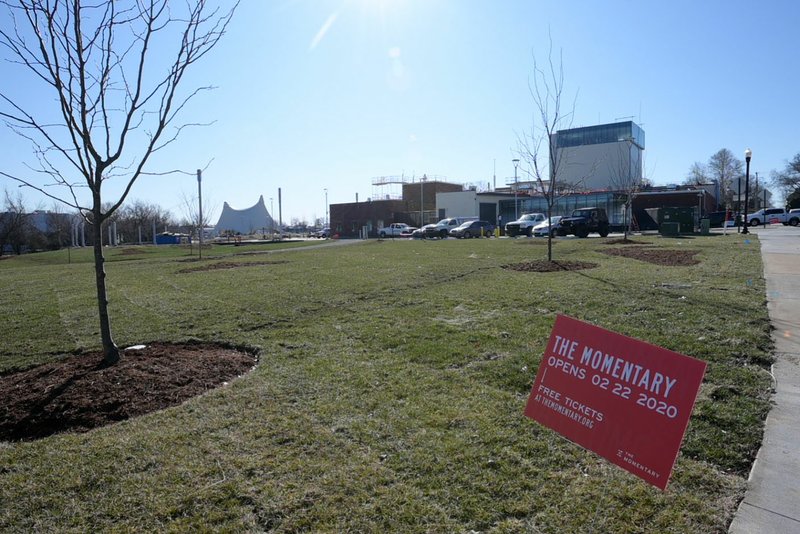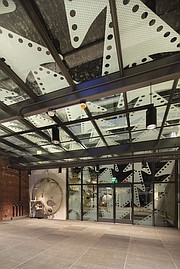BENTONVILLE -- A contemporary art space like none other in Northwest Arkansas will open its doors to the public Saturday.
The Momentary is a 63,000-square-foot venue in a former Kraft Foods cheese plant in the market district of southeast Bentonville. The venue will be the first in the region to offer multidisciplinary art programming to include visual, performing and culinary art experiences; festivals; and an artists-in-residence program all in one location, according to Lieven Bertels, Momentary director.
Crystal Bridges Museum of American Art owns the nonprofit venue, which was inspired by the vision of Tom, Olivia and Steuart Walton, according to Emily Neuman, Momentary public relations manager. The Walton Family Foundation is supporting the project to enhance the quality of life in the region by cultivating arts and cultural experiences providing opportunities for education, engagement and enjoyment, she said.
"We're all making this region into something new together," Bertels said. "This project is just so symbolic of that, where you can come in with vision, you can come together with experts, you can take what's already there and then elevate it and make it better."
A wide variety of costs associated with building the Momentary prevent staff from providing the amount spent to adapt the space, Neuman said. Crystal Bridges bought the land for about $1.5 million in 2016, according to the Benton County Assessor's Office.
The multidisciplinary space is indicative of how people live today, Bertels said.
"These days, your fridge isn't just a fridge. Your tablet is used for entertainment, for email, for general information sharing. You're browsing the internet, planning your trips, doing your banking," he said. "So almost everything in life needs to be like a Swiss Army knife, and why wouldn't an art center be like that?"
The multidisciplinary nature of the Momentary speaks to how modern artists are creating, said Joseph Thompson, Massachusetts Museum of Contemporary Art director.
[Can't see the podcast player above, click here.]
Mass MOCA is a multidisciplinary art museum that's been featuring performing and visual arts for 20 years in North Adams, Mass., Thompson said. The museum has a long-standing, collaborative relationship with Crystal Bridges and now the Momentary, he said.
Many modern artists work in multiple disciplines, making spaces such the Momentary ideal places to exhibit their work, Thompson said.
"If you're really serious about becoming a platform where artists working today can work, there needs to be a lot of fluidity, and the edges between stages and galleries need to be permeable," he said.
Creating a venue dedicating time and space to more than just performing or visual arts isn't something all venues can accomplish, Thompson said.
"This idea of a multidisciplinary space that's truly a platform for art across all fields -- video, sculpture, painting, dance, music -- that's something that we're both devoted to," Thompson said. "There's not a lot of them out there."
The addition of culinary art experiences at the Momentary makes it stand out even more among those multidisciplinary venues that do exist, he said.
Culinary offerings at the Momentary will be built around locally sourced produce, healthy options and reasonably small portions, Bertels said.
The venue opens to members Friday and to the general public at 10 a.m. Saturday.
Honoring history
Collaboration with Mass MOCA and the Momentary was particularly valuable because of similarities between the venues, Bertels said. Both are built in repurposed industrial spaces, using adaptive reuse practices allowing architects to change the buildings' uses while maintaining the original feel, he said.
"This is a canvas to really speak to the experience here in the heartland," he said.
The Momentary staff has embraced the history of the former cheese plant, Bertels said.
Visitors can eat lunch amid art in The Break Room, where plant workers once found respite, he said. The Fermentation Hall is a gallery for performing and visual arts where the cheese making process began.
The original brick walls and exposed pipes are offset by clean, white walls strategically placed throughout multiple galleries to exhibit artwork, Bertels said. The boiler, although no longer operational, is still in place in the multifunctional space of the Boiler Room.
Those types of industrial touches inspire many artists, he said.
The museum design also honors Native American history, Bertels said. The Osage tribe once used the land as hunting grounds, he said.
Past meets present in the design of the 70-foot-tall tower with a bar on top, Neuman said. The tower has multiple interior mezzanines for visual and performing arts and social events, she said.
"The Tower's exterior is dressed with glass panels that feature a design pattern by artist Addie Roanhorse, who drew inspiration from traditional Osage attire, paying homage to the land around the Momentary," Neuman said. "The pattern is also featured in the building's entryway and Container, a glass-enclosed space off the loading dock that will be used for social gatherings."
Visual arts
Designing a functional multidisciplinary art space in a former cheese plant presented challenges, Bertels said.
The building had no heat until the new system was turned on in November, he said.
"As a cheese factory, the only thing you were doing was chilling and cooling it," Bertels said.
There were gas and electric heaters in the factory, but Calli Verkamp, lead project architect with Wheeler Kearns Architects, said she can't confirm how they were used.
"All mechanical systems have been replaced, making all heating and cooling systems for the Momentary new," Verkamp said.
The building also had to become compliant with the federal Americans with Disabilities Act, he said.
"That's when you find that actually there's like seven different floor levels and you need to build ramps and elevators and things like that," Bertels said.
Displaying visual art in a space that's so different from a museum required creative thinking, said Lauren Haynes, curator of visual arts at the Momentary and curator of contemporary art at Crystal Bridges.
"The history of the building is still very present," Haynes said. "It's a space where you have to make sure the artists understand what the space is and what all the opportunities are in the space for them."
Adaptive reuse spaces often have more natural light and can display art that doesn't need to have the same type of preservation practices used in a museum, Thompson said.
"You may do more sculpture, you may show more video installations and less works on paper or photographs or things that are more delicate," he said. "The buildings are a little more rough-hewn, and so the art often tends to be a little more rough-hewn."
The scope of visual arts the Momentary can exhibit is huge, but the space's potential hasn't yet been realized, Haynes said.
"Being able to bring artists in and have them see the space and have the conversation, that's going to open up so many different opportunities," she said. "They're going to see the space in a completely different way than we do."
The Momentary's inaugural exhibit will be State of the Art 2020, which will be shared with Crystal Bridges, Haynes said. The artwork will be from artists throughout the country based on the themes of world-building, sense of place, mapping and temporality.
The exhibit continues the experience that began with State of the Art: Discovering American Art Now, which was offered at Crystal Bridges in 2014, Neuman said.
Performing arts
Introducing performing arts into a space not originally designed for that use creates an entirely different environment than would exist in a venue intended for that specific purpose, said Pia Agrawal, the Momentary's performing arts curator.
Working within a variety of spaces is a constant factor within the discipline, Agrawal said.
"I don't think we're in a particular moment where people are really wanting to be in theaters, or really wanting to be site specific," she said. "It depends on the artists."
Performing arts will be showcased in "Time Being," the debut festival of dance, music and theater that celebrates the venue's opening.
The Momentary features multiple locations for performances, including Fermentation Hall, the outdoor Momentary Green and the versatile Rode House, a multidisciplinary performance space built in the former milk intake room, Neuman said.
The Rode House can seat about 350 people and has an adjustable floor system, she said. The room can be changed quickly and easily for multiple stage and seating configurations, giving performers the freedom to manipulate the space.
The Momentary was intentionally designed to be flexible, Bertels said.
"We learned that if you build things permanently, it's much harder to hit all of the home runs you want to hit," he said.
There's a fluidity to the building that presents few limits to what can be achieved in the space and that allows for creating a new experience for visitors on each visit, Agrawal said.
Social environment
General admission to the Momentary is free, which helps contribute to the social experience of the space, Bertels said. Select events and experiences may require an entry fee or a ticket to attend.
"The experience is more than just the art on walls with some beautiful lighting," Bertels said. "The experience is really everything from the minute you walk into the door."
Visitors don't have to come only to see a particular exhibit or performance, Haynes said. They can drop in just for a cup of coffee, to grab some lunch or to charge their phone, she said.
"There's those elements that are built in, but there's also this idea that hopefully the art that they're going to see and experience will be a conversation starter," she said.
The Momentary won't have a permanent collection, Bertels said. The venue will offer two or three core exhibitions annually, usually lasting four to six months, he said.
Free general admission encourages return visits as well, Haynes said.
"That's something that we learned at Crystal Bridges," she said.
Culinary experiences beyond what's offered in The Break Room will be added later in the year, Bertels said.
Local, national and international chefs will be invited to create culinary events that visitors can pay to attend, he said.
"We want to look at what we can do outside as well with our festival field, the Momentary Green, and we have an amazing Tower Bar," Bertels said of expanding the venue's culinary experiences. The bar is at the top of the tower and is the highest accessible point for the public in Bentonville, he said.
Visitors can also look forward to seeing artists in residence work, he said. The Momentary has a sculpture studio, a painting studio and an audio visual studio for resident artists.
The studios range from 460 to 860 square feet, Neuman said. Residencies could range from a matter of weeks to months, depending on the project, Bertels said.
Performing arts residents will use the variety of spaces in the venue, Bertels said.
The artist residency program started a couple years ago with artist working at other locations in the area, Bertels said.
Upcoming residencies include Nick Vaughan and Jake Margolin, interdisciplinary artists from Houston, Neuman said. The duo will be at the Momentary from April to May to work on a series of 50 artworks.
The 50 States project is part of a series of installations the artists are creating inspired by recently discovered or unappreciated historical stories regarding sexual and gender identity. The Arkansas artwork is inspired by a 1920s history of an interracial gay couple from Harrison.
The work of resident artists will be considered for exhibition at the Momentary on a case-by-case basis, Haynes said.
Resident artists' work may be considered for integration into the Momentary's exhibits, Bertels said, but visitors will be able to watch the artists work at open studio days. The artists will have privacy to create within their studios at other times, he said.
Next steps
Bertels said the staff is looking toward what else the venue may be able to bring to the region.
"We will start announcing some plans once we're in our second or third year," he said.
"What we can say is that it's going to be very focused on that connection between the visitor and the artist," he said. "It's not about us. It's about the art and the artists and the audience, the public. We need to get them together so that they can gel and connect."
Continued work by the Momentary creates a chance to develop a region where artists can see the opportunity to thrive, rather than feeling the need to move to major metropolitan art centers like Los Angeles or New York City, Bertels said.
"I'm excited about the fact that a lot of really new, inventive work is being done at the edge of the radar -- away from what we think of the cultural centers of our country," Thompson said.
"It's going to be an important addition, not just to your life in Northwest Arkansas, but to the cultural treasury of the entire United States," he said. "We welcome the Momentary as a colleague."
Location
The Momentary is at 507 S.E. E St. in Bentonville. See www.themomentary.org for more information.
NW News on 02/16/2020
The story originally posted on 2/16/20 at 1:05 a.m.


